人教版(2019)必修 第一册Unit 2 Travelling around Video Time课件(共24张PPT)
文档属性
| 名称 | 人教版(2019)必修 第一册Unit 2 Travelling around Video Time课件(共24张PPT) |

|
|
| 格式 | pptx | ||
| 文件大小 | 102.4MB | ||
| 资源类型 | 教案 | ||
| 版本资源 | 人教版(2019) | ||
| 科目 | 英语 | ||
| 更新时间 | 2023-09-04 20:25:57 | ||
图片预览


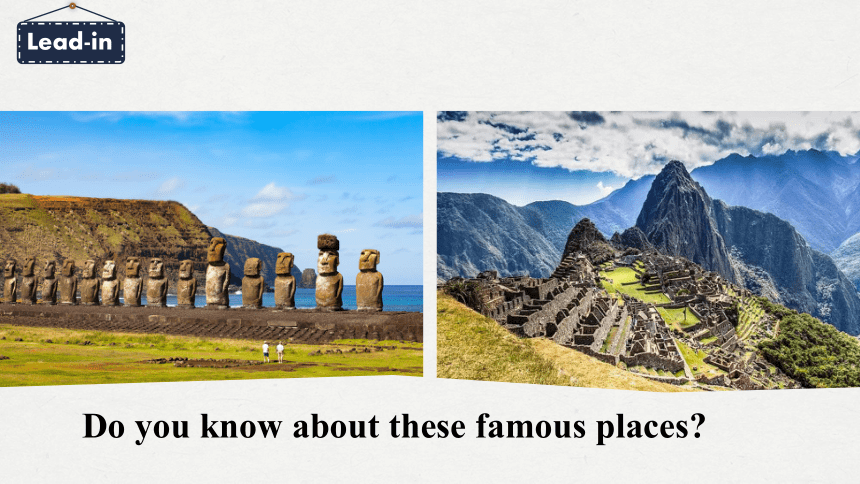
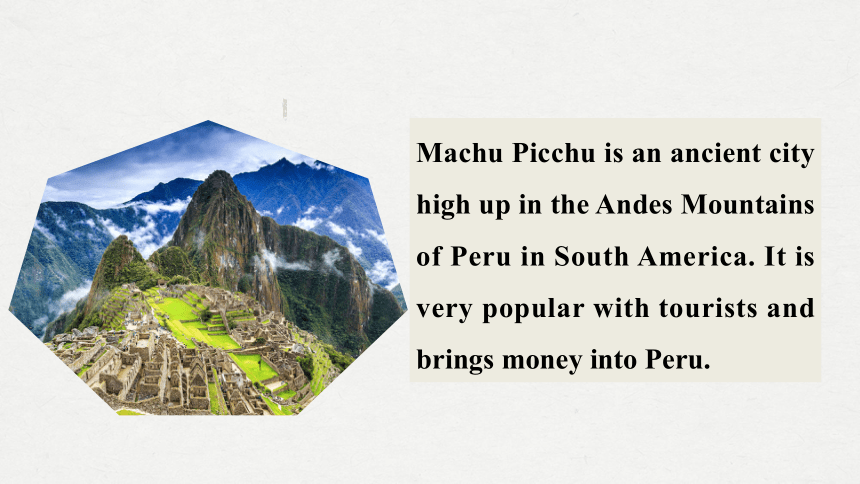
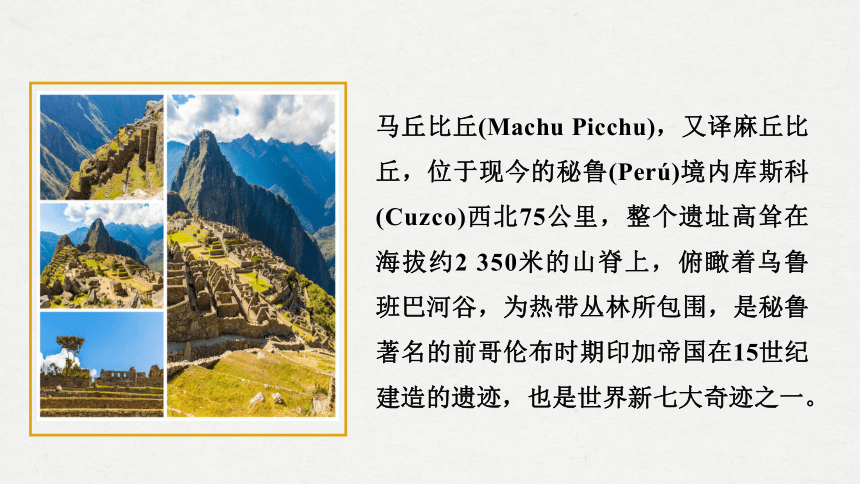
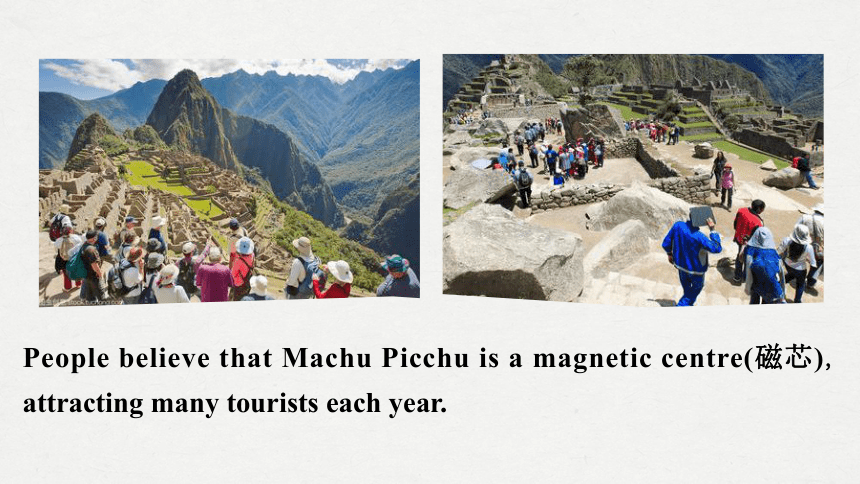
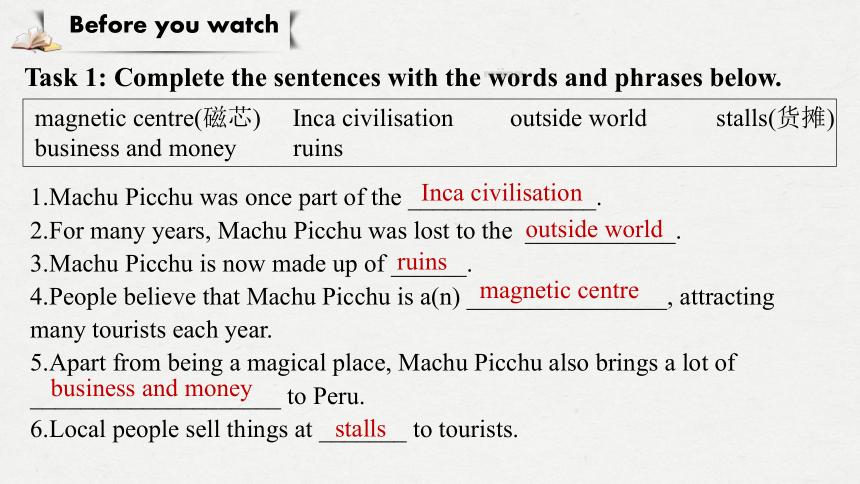
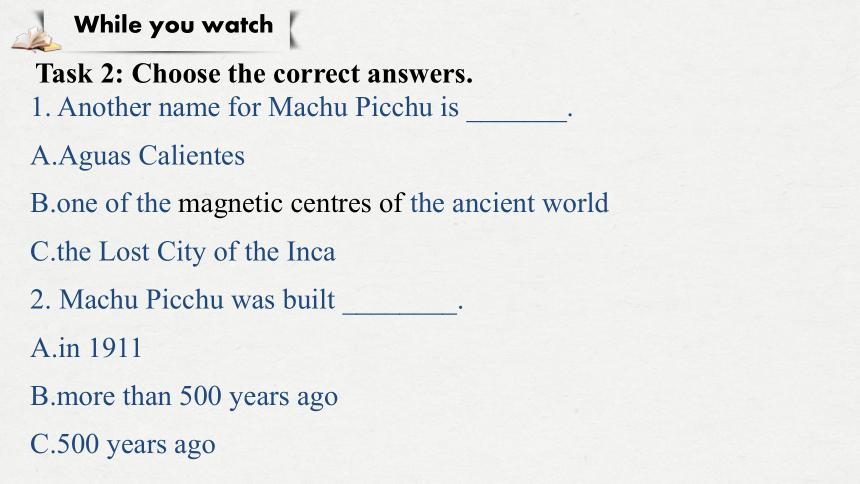
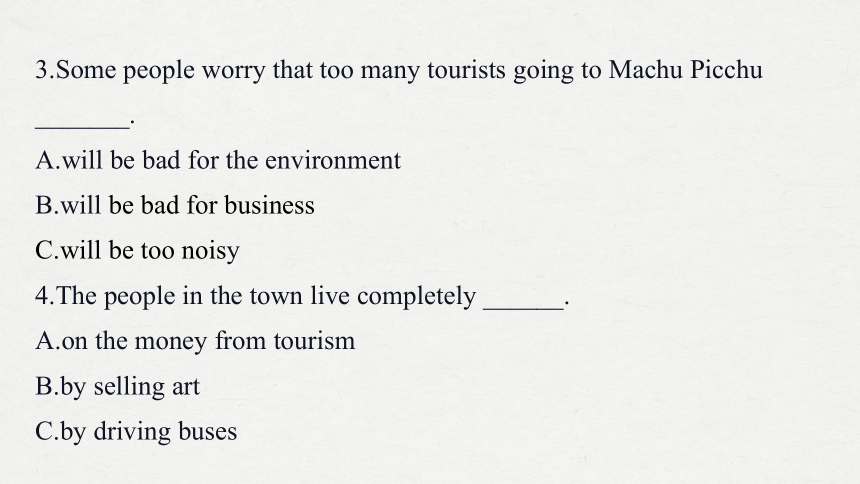
文档简介
(共24张PPT)
Unit 2
Travelling around
Video Time
By the end of this period, you will be able to:
1. collect key information about Machu Picchu through the video;
2. describe the changes of Machu Picchu from the past to today;
3. state your opinions on whether tourism should be stopped in
places like Machu Picchu.
Do you know about these famous places
Lead-in
Machu Picchu is an ancient city high up in the Andes Mountains of Peru in South America. It is very popular with tourists and brings money into Peru.
马丘比丘(Machu Picchu),又译麻丘比丘,位于现今的秘鲁(Perú)境内库斯科(Cuzco)西北75公里,整个遗址高耸在海拔约2 350米的山脊上,俯瞰着乌鲁班巴河谷,为热带丛林所包围,是秘鲁著名的前哥伦布时期印加帝国在15世纪建造的遗迹,也是世界新七大奇迹之一。
People believe that Machu Picchu is a magnetic centre(磁芯), attracting many tourists each year.
magnetic centre(磁芯) Inca civilisation outside world stalls(货摊)
business and money ruins
1.Machu Picchu was once part of the _______________.
2.For many years, Machu Picchu was lost to the ____________.
3.Machu Picchu is now made up of ______.
4.People believe that Machu Picchu is a(n) ________________, attracting many tourists each year.
5.Apart from being a magical place, Machu Picchu also brings a lot of ____________________ to Peru.
6.Local people sell things at _______ to tourists.
Task 1: Complete the sentences with the words and phrases below.
Before you watch
Inca civilisation
outside world
ruins
magnetic centre
business and money
stalls
Task 2: Choose the correct answers.
1. Another name for Machu Picchu is _______.
A.Aguas Calientes
B.one of the magnetic centres of the ancient world
C.the Lost City of the Inca
2. Machu Picchu was built ________.
A.in 1911
B.more than 500 years ago
C.500 years ago
While you watch
3.Some people worry that too many tourists going to Machu Picchu _______.
A.will be bad for the environment
B.will be bad for business
C.will be too noisy
4.The people in the town live completely ______.
A.on the money from tourism
B.by selling art
C.by driving buses
5.Machu Picchu may be changed forever by ______.
A.the weather
B.poverty
C.tourism
1.Another name for Machu Picchu is _______.
A.Aguas Calientes
B.one of the magnetic centres of the ancient world
C.the Lost City of the Inca
2.Machu Picchu was built ________.
A.in 1911 B.more than 500 years ago C. 500 years ago
3.Some people worry that too many tourists going to Machu Picchu _______.
A.will be bad for the environment
B.will be bad for business
C.will be too noisy
4.The people in the town live completely ______.
A.on the money from tourism
B.by selling art
C.by driving buses
5.Machu Picchu may be changed forever by ______.
A.the weather B.poverty C.tourism
Narrator: This beautiful, quiet place is covered in sunshine and has mountains all around it. Its name is Machu Picchu. It’s sometimes called the Lost City of the Inca, and it’s nearly 8,000 feet up in the Andes.
Julio: It’s a magic attraction that you can feel it here. It’s known all over the world that Machu Picchu is one of the magnetic centers of the ancient world. Narrator: Machu Picchu is more than 500 years old. Today, it’s a favorite place for visitors from all over the world. Even in the rain and fog, it’s wonderful to walk through the ruins. When the Inca civilization ended, few people knew Machu Picchu existed. For a long time it was lost to the outside world. Then, in 1911, an explorer called Hiram Bingham found it again.
Task 3: Read together.
Narrator: At first, very few people visited Machu Picchu. But now, hundreds of tourists come here every day. They walk up the steps of the ancient city and climb over the ruins. Machu Picchu is no longer quiet. It’s full of the sounds of tourists.
Some people in Peru hope that more tourists will come here. They think it will mean more business and money for the country. However, some conservationists worry that more visitors won’t be good for Machu Picchu. They say that tourism may not be good for the environment.
Narrator: Jose, a local hotel owner says Machu Picchu and Peru can take a few more visitors.
Joser: Why not be like the rest of the world Why not expose and show Machu Picchu to the rest of the world It’s such a wonderful place, why keep it to a few
Narrator: The truth is that parts of Peru are very poor, and tourists bring money to these communities. Aguas Calientes is a town that grew suddenly near an area where visitors get on buses to get to the summit of Machu Picchu. The people here live completely on money from tourism. The town is just a group of stalls where local people sell art and things they have made to visitors.
Narrator: The Lost City is no longer lost. Tourists have found it. The modern world is coming closer to this ancient world every day.
Narrator: Time may be running out for the Lost City of the Inca. More and more people are discovering it. In the end, it may be the modern world that forever changes this ancient city.
1. Are there any places like Machu Picchu in China In what ways are they alike
After you watch
Work in pairs. Discuss the questions.
2.Should tourism be stopped in places like Machu Picchu Why or why not
1. Are there any places like Machu Picchu in China In what ways are they alike
There are a few places like Machu Picchu in China, for example, Hailongtun Tusi Fortress(海龙屯土司要塞). Hailongtun Tusi Fortress is like Machu Picchu in that they are both located high up in the mountains and their architectural styles are unique.
Hailongtun Tusi Fortress
Hailongtun Tusi Fortress is located at the peak of Longyan mountain, 16 kilometres north downtown Zunyi in Guizhou Province. It has gone through Song,Yuan and Ming Dynasties. It is an important historic site of Bozhou (Zunyi was called Bozhou in ancient times.)Yang Clan Tusi Culture(杨氏土司文化) in southwest China. With the 9 passes, walls and watch towers, Hailongtun is an outstanding representative of Chinese ancient military fortress, which was first built in the 5th year of Baoyou in Song Dynasty.
2.Should tourism be stopped in places like Machu Picchu Why or why not
Tourism should not be stopped in places like Machu Picchu. While such places need to be protected, this should be balanced by the need for the world to see and experience their wonders, and the need for local people to make a living.
本课结束
Unit 2
Travelling around
Video Time
By the end of this period, you will be able to:
1. collect key information about Machu Picchu through the video;
2. describe the changes of Machu Picchu from the past to today;
3. state your opinions on whether tourism should be stopped in
places like Machu Picchu.
Do you know about these famous places
Lead-in
Machu Picchu is an ancient city high up in the Andes Mountains of Peru in South America. It is very popular with tourists and brings money into Peru.
马丘比丘(Machu Picchu),又译麻丘比丘,位于现今的秘鲁(Perú)境内库斯科(Cuzco)西北75公里,整个遗址高耸在海拔约2 350米的山脊上,俯瞰着乌鲁班巴河谷,为热带丛林所包围,是秘鲁著名的前哥伦布时期印加帝国在15世纪建造的遗迹,也是世界新七大奇迹之一。
People believe that Machu Picchu is a magnetic centre(磁芯), attracting many tourists each year.
magnetic centre(磁芯) Inca civilisation outside world stalls(货摊)
business and money ruins
1.Machu Picchu was once part of the _______________.
2.For many years, Machu Picchu was lost to the ____________.
3.Machu Picchu is now made up of ______.
4.People believe that Machu Picchu is a(n) ________________, attracting many tourists each year.
5.Apart from being a magical place, Machu Picchu also brings a lot of ____________________ to Peru.
6.Local people sell things at _______ to tourists.
Task 1: Complete the sentences with the words and phrases below.
Before you watch
Inca civilisation
outside world
ruins
magnetic centre
business and money
stalls
Task 2: Choose the correct answers.
1. Another name for Machu Picchu is _______.
A.Aguas Calientes
B.one of the magnetic centres of the ancient world
C.the Lost City of the Inca
2. Machu Picchu was built ________.
A.in 1911
B.more than 500 years ago
C.500 years ago
While you watch
3.Some people worry that too many tourists going to Machu Picchu _______.
A.will be bad for the environment
B.will be bad for business
C.will be too noisy
4.The people in the town live completely ______.
A.on the money from tourism
B.by selling art
C.by driving buses
5.Machu Picchu may be changed forever by ______.
A.the weather
B.poverty
C.tourism
1.Another name for Machu Picchu is _______.
A.Aguas Calientes
B.one of the magnetic centres of the ancient world
C.the Lost City of the Inca
2.Machu Picchu was built ________.
A.in 1911 B.more than 500 years ago C. 500 years ago
3.Some people worry that too many tourists going to Machu Picchu _______.
A.will be bad for the environment
B.will be bad for business
C.will be too noisy
4.The people in the town live completely ______.
A.on the money from tourism
B.by selling art
C.by driving buses
5.Machu Picchu may be changed forever by ______.
A.the weather B.poverty C.tourism
Narrator: This beautiful, quiet place is covered in sunshine and has mountains all around it. Its name is Machu Picchu. It’s sometimes called the Lost City of the Inca, and it’s nearly 8,000 feet up in the Andes.
Julio: It’s a magic attraction that you can feel it here. It’s known all over the world that Machu Picchu is one of the magnetic centers of the ancient world. Narrator: Machu Picchu is more than 500 years old. Today, it’s a favorite place for visitors from all over the world. Even in the rain and fog, it’s wonderful to walk through the ruins. When the Inca civilization ended, few people knew Machu Picchu existed. For a long time it was lost to the outside world. Then, in 1911, an explorer called Hiram Bingham found it again.
Task 3: Read together.
Narrator: At first, very few people visited Machu Picchu. But now, hundreds of tourists come here every day. They walk up the steps of the ancient city and climb over the ruins. Machu Picchu is no longer quiet. It’s full of the sounds of tourists.
Some people in Peru hope that more tourists will come here. They think it will mean more business and money for the country. However, some conservationists worry that more visitors won’t be good for Machu Picchu. They say that tourism may not be good for the environment.
Narrator: Jose, a local hotel owner says Machu Picchu and Peru can take a few more visitors.
Joser: Why not be like the rest of the world Why not expose and show Machu Picchu to the rest of the world It’s such a wonderful place, why keep it to a few
Narrator: The truth is that parts of Peru are very poor, and tourists bring money to these communities. Aguas Calientes is a town that grew suddenly near an area where visitors get on buses to get to the summit of Machu Picchu. The people here live completely on money from tourism. The town is just a group of stalls where local people sell art and things they have made to visitors.
Narrator: The Lost City is no longer lost. Tourists have found it. The modern world is coming closer to this ancient world every day.
Narrator: Time may be running out for the Lost City of the Inca. More and more people are discovering it. In the end, it may be the modern world that forever changes this ancient city.
1. Are there any places like Machu Picchu in China In what ways are they alike
After you watch
Work in pairs. Discuss the questions.
2.Should tourism be stopped in places like Machu Picchu Why or why not
1. Are there any places like Machu Picchu in China In what ways are they alike
There are a few places like Machu Picchu in China, for example, Hailongtun Tusi Fortress(海龙屯土司要塞). Hailongtun Tusi Fortress is like Machu Picchu in that they are both located high up in the mountains and their architectural styles are unique.
Hailongtun Tusi Fortress
Hailongtun Tusi Fortress is located at the peak of Longyan mountain, 16 kilometres north downtown Zunyi in Guizhou Province. It has gone through Song,Yuan and Ming Dynasties. It is an important historic site of Bozhou (Zunyi was called Bozhou in ancient times.)Yang Clan Tusi Culture(杨氏土司文化) in southwest China. With the 9 passes, walls and watch towers, Hailongtun is an outstanding representative of Chinese ancient military fortress, which was first built in the 5th year of Baoyou in Song Dynasty.
2.Should tourism be stopped in places like Machu Picchu Why or why not
Tourism should not be stopped in places like Machu Picchu. While such places need to be protected, this should be balanced by the need for the world to see and experience their wonders, and the need for local people to make a living.
本课结束
